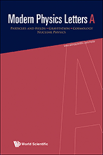
MODERN PHYSICS LETTERS A
Scope & Guideline
Exploring the Depths of Astrophysics and Nuclear Physics
Introduction
Aims and Scopes
- Theoretical Physics:
Research articles in theoretical physics explore fundamental concepts and frameworks, including quantum mechanics, general relativity, and advanced field theories. This includes studies on black holes, cosmology, and quantum gravity. - Astrophysics and Cosmology:
The journal features significant contributions to our understanding of the universe, including studies on dark matter, dark energy, cosmic inflation, and the behavior of celestial bodies under various physical conditions. - Quantum Information Science:
A core area includes the study of quantum information, quantum computing, and quantum cryptography, focusing on the principles that govern quantum systems and their applications in technology. - Particle Physics:
Research related to the fundamental particles of the universe, including their interactions and properties, as well as investigations into beyond the Standard Model physics, such as supersymmetry and leptoquark theories. - Interdisciplinary Applications:
The journal also welcomes research that bridges physics with other disciplines, applying physical principles to complex systems in biology, chemistry, and materials science.
Trending and Emerging
- Quantum Gravity and Black Hole Physics:
There is a notable increase in research focused on quantum gravity theories and black hole thermodynamics, particularly in the context of Hawking radiation and information paradoxes. - Dark Matter and Dark Energy Models:
Emerging studies are delving into novel models and theories that address the mysteries of dark matter and dark energy, often integrating insights from quantum mechanics and particle physics. - Quantum Computing and Information Technologies:
The journal is increasingly publishing works that explore quantum computing protocols, quantum cryptography, and the implications of quantum entanglement for secure communication. - Cosmological Simulations and Observational Studies:
There is a growing trend towards using sophisticated simulations and observational data to understand cosmic structure formation, inflationary models, and the dynamics of the universe. - Nonlinear Dynamics and Complex Systems:
Research in nonlinear dynamics, chaos theory, and their applications to various physical systems is gaining prominence, reflecting the interdisciplinary nature of modern physics.
Declining or Waning
- Classical Mechanics:
While foundational, studies in classical mechanics have decreased in prominence, as more researchers pivot towards quantum mechanics and relativistic frameworks. - Thermodynamics of Conventional Systems:
Research focusing solely on classical thermodynamic systems is becoming less frequent as the field shifts to explore thermodynamic aspects in quantum and relativistic contexts. - Static Models in Cosmology:
Traditional static cosmological models are waning in favor of dynamic models that incorporate time-dependent parameters and interactions within the expanding universe. - Basic Nuclear Physics:
Although still relevant, basic studies in nuclear physics are being overshadowed by more complex investigations into exotic states and interactions involving dark matter and energy.
Similar Journals
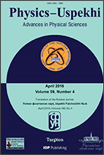
PHYSICS-USPEKHI
Exploring the Frontiers of Physics and AstronomyPHYSICS-USPEKHI, published by Uspekhi Fizicheskikh Nauk, is a prominent peer-reviewed journal in the field of physics and astronomy, reaching researchers and professionals since its inception in 1993. With an ISSN of 1063-7869 and an E-ISSN of 1468-4780, this esteemed journal has been classified as Q2 in the Physics and Astronomy category based on the 2023 quartiles, ranking 74 out of 243 journals in its Scopus classification, placing it in the 69th percentile. Although currently not an open access journal, it provides invaluable insights and advancements in the field, fostering an environment for scholarly exchange and collaborative research. Based in Moscow, Russia, PHYSICS-USPEKHI continues to shape the landscape of theoretical and experimental physics, inviting submissions that contribute to its rich legacy of high-impact scientific discourse.

Universe is a distinguished peer-reviewed journal published by MDPI, specializing in the dynamic fields of Physics and Astronomy. Established in 2015, this Open Access journal has rapidly gained recognition, achieving a prestigious Q1 quartile ranking in its category as of 2023. With its E-ISSN 2218-1997, the journal primarily serves the international scientific community, offering a platform for researchers to disseminate innovative ideas and findings. Based in Switzerland, Universe covers a wide range of topics within astronomy and astrophysics, ensuring that cutting-edge research is accessible to an ever-growing audience. Its commitment to open access principles since its inception allows for unrestricted dissemination of knowledge, fostering a collaborative environment essential for scientific advancement. By aligning its objectives with the promotion of high-quality research and interdisciplinary discourse, Universe stands as a vital resource for academics, professionals, and students aiming to contribute to and engage with the ever-evolving landscape of astronomical research.

EUROPEAN PHYSICAL JOURNAL C
Fostering a Community of Visionary ResearchersEUROPEAN PHYSICAL JOURNAL C (EPJ C), published by SPRINGER, stands as a premier platform for innovative research in the domains of Physics and Engineering. With its Open Access policy established in 2014, EPJ C ensures that groundbreaking findings are readily available to the global scientific community, enhancing accessibility and collaboration. The journal, indexed in prestigious databases, boasts an impressive impact factor and ranks within the Q1 category for both Engineering and Physics and Astronomy, placing it among the top-tier journals in these fields. Celebrated for its rigorous peer-review process, EPJ C offers a wide-ranging scope encompassing various topics in particle physics, quantum field theory, and related interdisciplinary studies. Its consistent publication since 1991 has fostered a vibrant community of researchers dedicated to advancing knowledge and innovation in physics and engineering. Join the scholarly discussion and contribute to the cutting-edge research made possible through EPJ C's esteemed platform.
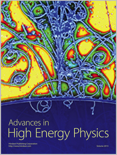
Advances in High Energy Physics
Unveiling the Universe: Your Gateway to High Energy DiscoveriesAdvances in High Energy Physics, published by HINDAWI LTD, is a premier open-access journal dedicated to the progressive field of Nuclear and High Energy Physics. With an ISSN of 1687-7357 and an E-ISSN of 1687-7365, this journal has been at the forefront of scientific discourse in high energy physics since its inception in 2007. The journal is notable for its impact within the community, currently holding a Q2 ranking in 2023 and positioned at #36 out of 87 in its category according to Scopus, highlighting its significant contribution to ongoing research and advancement in the field. Its accessible nature enables researchers, professionals, and students to engage with cutting-edge findings that shape our understanding of the universe. Spanning publications from 2010 through 2024, Advances in High Energy Physics serves as an invaluable resource for those looking to stay informed about the latest developments and methodologies in high energy physics across the globe.
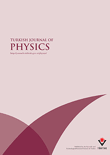
Turkish Journal of Physics
Connecting scholars with cutting-edge physics discoveries.Turkish Journal of Physics, established in 1994 and published by the Tubitak Scientific & Technological Research Council Turkey, is a prominent platform for the dissemination of innovative research in the field of physics and related areas. With an ISSN of 1300-0101 and an E-ISSN of 1303-6122, this journal has carved a niche in the academic community, evidenced by its ranking within the Q3 category in the 2023 evaluation of Physics and Astronomy. As it converges its published works toward the year 2024, researchers and scholars are encouraged to engage with its rich repertoire of studies that covers general physics and astronomy, currently holding a Scopus rank of #96 out of 243, placing it in the top 60th percentile. The Turkish Journal of Physics serves as a vital resource for advancing knowledge, fostering collaborative research, and providing insights into contemporary advancements in the discipline. While it operates under a subscription model, the quality and impact of its peer-reviewed articles make it an essential read for professionals and students alike, looking to stay informed on critical developments within the physics community.
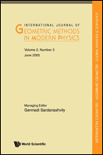
INTERNATIONAL JOURNAL OF GEOMETRIC METHODS IN MODERN PHYSICS
Exploring the Intersection of Geometry and PhysicsINTERNATIONAL JOURNAL OF GEOMETRIC METHODS IN MODERN PHYSICS is a leading academic publication dedicated to the interdisciplinary exploration of geometric methods in the realms of modern physics. Published by WORLD SCIENTIFIC PUBL CO PTE LTD, this esteemed journal is based in Singapore and acts as a critical platform for researchers, professionals, and students seeking to delve into the intricacies of modern theoretical physics and its geometric foundations. With an impressive Scopus ranking placing it in the 64th percentile of its category, the journal highlights innovative research and developments from 2005 to 2024 within its scope. While currently not offering Open Access, it remains a vital resource for the dissemination of valuable knowledge in its field, contributing significantly to the advancement of physics and astronomy. We encourage the academic community to explore this exceptional journal for cutting-edge insights and to further enhance their understanding of geometric applications in modern scientific inquiry.

Physics of the Dark Universe
Charting New Frontiers in Cosmic UnderstandingPhysics of the Dark Universe is a premier academic journal published by Elsevier, dedicated to advancing the understanding of dark matter, dark energy, and their implications for the universe. With its ISSN N/A and E-ISSN 2212-6864, the journal has established a notable presence since its inception in 2012, operating out of Amsterdam, Netherlands. As evidenced by its impressive impact factor and its ranking in the top quartile in both Astronomy and Astrophysics (Q1) and Space and Planetary Science (Q1) categories for 2023, this journal is a vital resource for researchers and practitioners within these fields. In the latest Scopus ranks, it ranks #12 out of 104 in Earth and Planetary Sciences and #13 out of 90 in Physics and Astronomy, placing it in the 88th and 86th percentiles respectively, underlining its academic significance. The journal is not Open Access, yet it plays an essential role in disseminating high-quality research that pushes the boundaries of knowledge about the cosmos and its most enigmatic components. Researchers, professionals, and students interested in the forefront of astrophysics will find this journal an indispensable tool for staying abreast of emerging discoveries and ongoing debates.

Gravitation & Cosmology
Elevating Understanding of Gravitational PhenomenaGravitation & Cosmology is a vital academic journal founded to explore the profound concepts of gravitation and the dynamics of the universe. Published by MAIK NAUKA/INTERPERIODICA/SPRINGER, this journal features a comprehensive range of research articles, reviews, and theoretical insights that advance the field of astronomy and astrophysics. With a current impact factor reflective of its esteemed contribution, Gravitation & Cosmology operates within the upper tier of its discipline, classified as Q3 in Astronomy and Astrophysics for 2023. Although not an open-access publication, the journal fosters a vibrant community of scholars and practitioners by providing rigorous peer-reviewed content accessible through various academic platforms. Covering converged years from 2008 to 2024, this journal serves as an indispensable resource for anyone keen on deepening their understanding of gravitational phenomena and cosmological theories. Researchers, professionals, and students alike will find valuable insights and innovative research that push the boundaries of contemporary astrophysical knowledge.
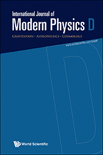
INTERNATIONAL JOURNAL OF MODERN PHYSICS D
Pioneering Discoveries in Astronomy and AstrophysicsWelcome to the INTERNATIONAL JOURNAL OF MODERN PHYSICS D, a premier publication dedicated to the advancement of knowledge in the fields of Astronomy and Astrophysics, Mathematical Physics, and Space and Planetary Science. Published by WORLD SCIENTIFIC PUBL CO PTE LTD in Singapore, the journal boasts an impressive impact, being ranked Q2 in Astronomy and Astrophysics and Mathematical Physics, and Q3 in Space and Planetary Science. With a converged publishing timeline from 1996 to 2024, this journal provides a vital platform for researchers and professionals to disseminate their findings, engage with cutting-edge research, and explore emerging ideas in modern physics. Although it operates under a traditional access model, the rigorous peer-reviewed process ensures that only the highest quality research contributes to the collective understanding of our universe. Join us in advancing the frontiers of physics and astronomy!

Physics of Particles and Nuclei Letters
Advancing the Frontiers of Particle and Nuclear PhysicsPhysics of Particles and Nuclei Letters, published by PLEIADES PUBLISHING INC, serves as a pivotal platform for the dissemination of cutting-edge research in the domains of particle and nuclear physics. With an ISSN of 1547-4771 and an E-ISSN of 1531-8567, this journal has been actively contributing to the scientific community since its inception in 2006 and continues to be influential, with a convergence period extending to 2024. While its open access options are limited, the journal is recognized for its rigorous peer-review process and commitment to quality, as reflected in its Scopus rankings across multiple categories, including a Q3 in Nuclear and High Energy Physics and Radiation in 2023. The journal is positioned to be a vital resource for researchers aiming to bridge theoretical understanding with practical applications in these highly specialized fields, fostering advances that resonate within atomic and molecular physics, radiology, and beyond. Its relevance continues to grow as the global scientific community seeks innovative solutions to complex problems in modern physics.